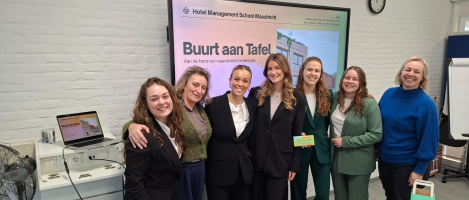 1950-2025 Roots and Wings
Discover our 75th anniversary
1950-2025 Roots and Wings
Discover our 75th anniversary

A Letter from Minister Robbert Dijkgraaf
"Like a true Salomon, Dijkgraaf has to strike a balance between, on the one hand, the politicians who use high words like: 'influx', 'containment' and 'uncontrollable.' And on the other hand higher education, which has invested in a complete infrastructure to shape the 'international classroom'."
Dutch higher education is eagerly awaiting a letter. Not a 'Letter from the King', but a letter from Robbert Dijkgraaf, the Minister of Education, Culture and Science. The letter is a response to the political debate that flared up late last year about the internationalisation of higher education. Several MPs called for limiting the number of international students and a return to Dutch in all undergraduate courses. A motion was passed and the minister must respond to it. It will be hard on him. As a scientist, he knows how enriching collaborating and learning in an international educational environment is. And how that prepares you for a career in an international or simply diverse environment. Whether that is the Chemelot campus, ASML, a hotel or André Rieu's orchestra?

The international classroom
Like a true Salomon, Dijkgraaf has to strike a balance between, on the one hand, the politicians who use high words like: 'influx', 'containment' and 'uncontrollable'. And on the other hand higher education, which has invested in a complete infrastructure to shape the 'international classroom'. They have attracted talented international academics, set up a structure of recruitment, integration and exchange of international students. So that all Dutch students can have an international experience. Because the international classroom is so much more than speaking English in class. It is about learning with students from diverse backgrounds. Based on a well-considered vision of what you want to achieve. Purposefully building an international and intercultural dimension into education. Both in the formal and informal learning process. And to properly support teachers and students to flourish in such an environment.
Mentioned politicians throw it (typically Dutch?) mainly on money. The Netherlands was the leader for years, but mainly on short-term exchange. Only 2.9% of our students follow a full programme abroad. And that is where the shoe pinches. Four times as many students come here than go abroad. In addition, they deploy the language weapon. Teaching in English would be at the expense of Dutch students' Dutch. I have never seen any scientific evidence for this. But that aside. There are certainly excesses like an English-medium Dutch history course or a Bachelor of Psychology with 90% international students. Those need to be addressed. But it is no reason to ‘throw out a healthy child with the bathwater’, as the Dutch saying goes.
Elina from Jena and Jade from Kerkrade
Internationalisation costs money, but it also delivers a lot. The international classroom, with or without international students, can be of great added value. Erasmus University research shows that Dutch students in particular benefit from it. They develop their international competences partly through contact with international students and teachers. Think empathy, adaptability, resilience and social initiative. All qualities that make employers happy. International students are also an enrichment for teachers. Besides Fleur from Etten Leur and Martijn from Stein, we get to know the perspective of Nikos from Chios and Elina from Jena. Moreover, one in four international students stays in the Netherlands. This provides the economy with high-quality specialists and the treasury, after costs, with 1.5 billion euros a year. The other three contribute to the Netherlands' reputation as a knowledge country at home.
Our eastern neighbours, by the way, have got it. Germany is actually going to invest heavily in internationalisation of higher education. More English-language courses, scholarships for international talents and welcome centres in all university cities. By 2030, Germans will have trained 50,000 high-quality international workers to address expected labour market shortages. I wish Robert Dijkgraaf success in his difficult job. Hopefully, he will resist the lure of populist short-term solutions that only have losers in the end. Elina from Jena, but also Jade from Kerkrade.
Highlights

Graduation project Xplore
Students defended their graduation project, conducted on behalf of Global Minds @ Work. The project took place at Xplore, an Agora…


White Paper Publication Global Minds @ Work
The study explores how internship supervisors assess reflective blogs written by students during their intercultural internships…


Immersive Wine Tasting in the Food Experience Lab
The Research Centre Future of Food created a unique immersive wine tasting. All visitors were transported straight to a Tuscan…

